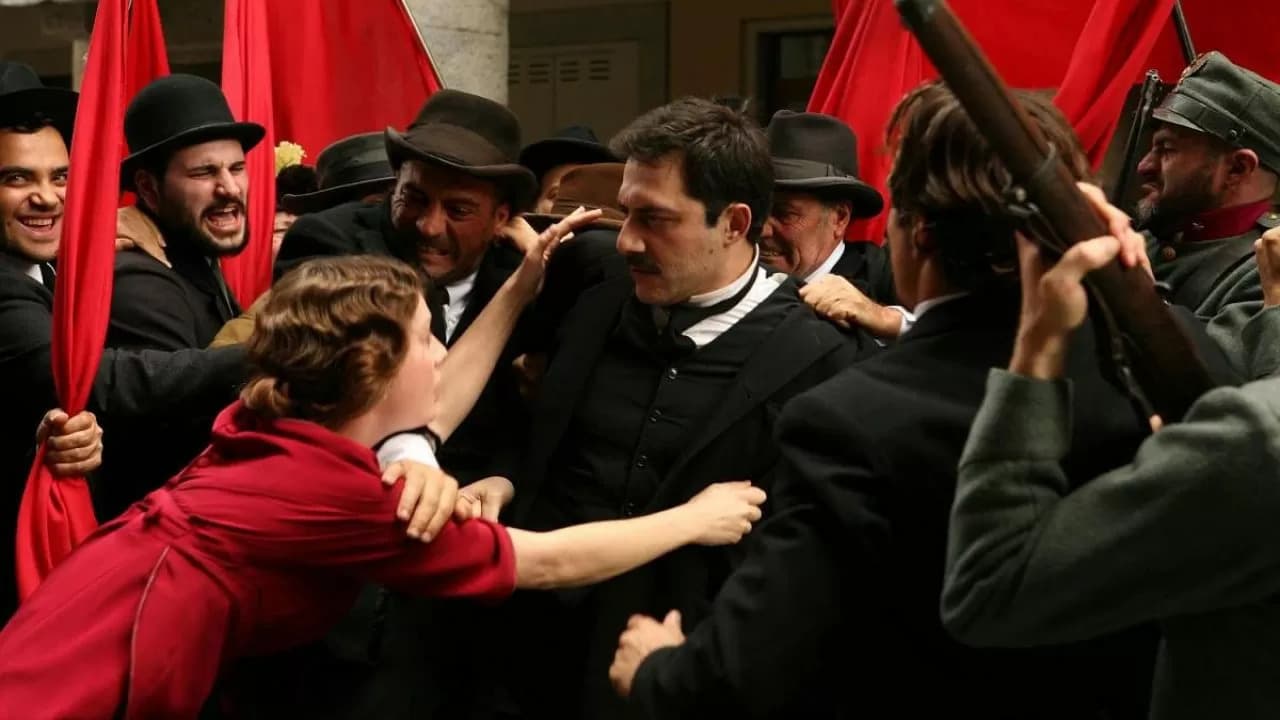



After playing with our expectations, this turns out to be a very different sort of film.
View MoreIt’s not bad or unwatchable but despite the amplitude of the spectacle, the end result is underwhelming.
View MoreLet me be very fair here, this is not the best movie in my opinion. But, this movie is fun, it has purpose and is very enjoyable to watch.
View MoreBlistering performances.
The beginning of the XXIst Century gave Italy the well-needed reminder of the realities of Mussolini's reign of power. After a storm of revisionism came the story of Ida Dalser, Mussolini's secret lover and possible wife, who suffered state persecution during his march to power. Given Italy has seemingly forgotten the legacy of Mussolini in chemical-warfare annihilated Ethiopia, a more personal account of the man's cruelty seems to have been a necessity.Ida Dalser (Giovanna Mezzogiorno), obsessively in love with the indomitable and vigorous Mussolini (Filippo Timi), throws her life at his door during the heydays of the First World War, offering not only herself, but also all her belongings to fund Mussolini's party newspaper. Albeit no concrete proof of this exists (only indirect evidence regarding Mussolini's son using the phrase "his wife Ida Dalser") they most likely married in 1914, only for Mussolini to betray her trust and love by wedding Rachele Guidi (Michela Cescon). In the meantime Ida bears Mussolini's only son Benito Albino, a child disowned by his father to suffer the ignominy of being a bastard. As time unfolds and the position of Mussolini strengthens Ida and her child become a unwanted presence, which threatens to derail the career of the future power-crazed dictator. Ida's compulsive and unremitting love for Mussolini persists through time, despite her being a woman scorned, thus causing her to become a national risk, who must be locked away. Ostensibly both Ida and her son die locked up in mental asylums, a tightly kept state secret, which must be disposed of."Vincere" fails to follow typical biographical structure, instead flowing through history with style and imagery, interspersed with archive material and frequenting us with visits to the cinema (in true European cinephile fashion). Events are essentially told linearly, but visually stylish flashbacks fill in spaces and ask questions on uncertain facts. The first half of the movie is a captivating victorious piece of cinema, accentuated by two tour de force performances by Mezzogiorno and Timi. The latter provides a forceful and believable performance of the Italian fascist, whose presence alone suddenly supplies apt justification to how he came to power. Timi also plays youthful Benito Albino, where he punctuates the movie with a heart-wrenching, powerful pastiche of Benito Mussolini after being locked up in an asylum. This however is trumped by a spectacular display by Mezzogiorno, compulsive lover repudiated by her husband and ultimately led to her downfall by the state. Shifting from youthful enthralment to verging on mental decrepitude Ida is portrayed masterfully and memorably.Nonetheless the movie falls apart about halfway, as focus diverts from the love affair itself and shifts towards the deadly fallout. Whereas the initial part of the movie captivates, while enraging with a mesmerising biographical portrayal, the second half starts to dwell on Ida's time at the asylum, which is cinematographically fruitless, as well as delivers countless unnecessary melodramatic scenes, which unnecessarily test viewer's patience. Amongst these a scene worthy of ridicule, as Ida gains a few moments of respite from her inevitable fate, wherein the whole town gathers to applaud her in a corny Hollywood fashioned culmination.Some of the storytelling is also off, as focus is placed strongly on imagery, film structure and less on viewer-proofing the understandability. For a lengthy period of the movie Ida is under the protection of one Riccardo Paicher, but questions on as to who this mysterious defender is are only answered towards the end, whereas a simple scene stating that this is Ida's brother-in-law would not have decapitated Bellochio's artistic endeavours.
View Morethe way Bellocchio show different aspects of dictator Mussolini' personality during a love story is great.I like the way he told his film story from beginning Mussolini was editor of avant and the steps he climb up to become great Mussolini the leader of Italia.by using parts of Documentary movies and the main title of newspapers through the Mussolini private life,Bellocchio create parallel lines of History and Politics and their affects on his characters lives.the way Ida looking after his son recall me (changeling) by Clint Eastwood although I like this Italian one more.in my opinion the best parts of movie is the last part.when Mussolini make a deal with God in 5 minuets and the smiley face of Ida looking at him and longing love for him.Mussolini forgot something that day.maybe 5 minuets for God last 30-40 years for us. I recommend this movie highly to everyone to know the irresponsible hands took the responsible of many peoples's destiny.
View MoreThis film as other reviewers have noted....starts out powerfully and then kind of loses its appeal.The problem is Ida Dreslar's life in an insane asylum is just not that interesting and it starts to lose you. Once Mussolini discards her the rest of her life is boring. But also her character is disturbing her fatal attraction to Mussolini and her inability to keep her mouth shut and live a normal life. She was insane seems to be the right answer.Beautifully filmed -- the actor Timi is far better looking than Mussolini... Mezzogiorno is attractive and plays the mad role well... although the mad house scenes were mostly camp.
View More"Vincere" is an artful biopic that tells the story of Benito Mussolini's mistress and perhaps first wife, Ida Dalser (Giovanna Mezzogiorno). The film jumps around the time line, mainly from the point of view of Ida, with a mixture of heated political rallies and shout fests, intense love scenes (mostly early in the movie, hidden in darkness), real footage of a pompous Mussolini, and operatic melodrama.It's not a biopic of Mussolini, but we see glimpses of his early socialist and atheist convictions, his conversion to fascism, and his eventual support for the church (for politically expedient purposes until old age, judging from the history). We hear Mussolini dream of an Italy that surpasses morality and brings about fundamental changes. He's not specific, but he doesn't want to become like average folk. He wants to outdo even Napoleon.The film follows a TV documentary and two books about Ida, based on reporting by Marco Zeni. In the reports, Ida Dalser claims she married Benito Mussolini in 1914. She also had a son with him, named Benito Albino Mussolini. Historians don't have direct evidence she married Mussolini, but they have evidence he accepted responsibility for their son. For unknown reasons, he left her a year later and married Rachele Guidi after returning from the war.According to the history (not the film), his last mistress, Clara Petacci, was executed (by firing squad) and hung upside down in the Piazza Loreto (Milan) along with him. Ida might have had that to look forward to if she had been by his side (she doesn't seem like a stay at home or turn a blind eye type of wife – she would have been with him). Tragic madness is a common theme in drama, and Ida Dalser arguably has a touch of madness. Her love affair with Benito Mussolini (Filippo Timi) operatically moves from intense devotion to angry feud. She sells everything to fund his newspaper, gives him a son, and attempts to force him to divorce his wife and return her to her rightful place by his side. She won't even think of another man. Is it love, true devotion, or revenge?Most of the film tracks Ida Dalser in extremes of emotion, especially as corrupt Fascists suppress her and take her to a madhouse. She writes to everyone to try to publicize her marriage, including the pope, and she drags her son to Mussolini to dramatically express her outrage. My first thought in trying to describe Ida was, well, at least she didn't kill her son to get back at him. The movie doesn't explicitly depict her doing anything this mischievous, or perhaps the unthinkable is possible.Did she succeed in sacrificing her son to get back at Mussolini? It's possible she embellished her relationship with Mussolini and her extreme conviction rubbed off on her son. The odd thing is that this interpretation fits with Giovanna Mezzogiorno's compelling performance of Ida throughout the film. She seems in love with more than Mussolini. She wants to stand by his side and be the public wife of a dictator. For example, she won't consider signing a power of attorney to help provide financially for her son because it might be seen by (her imagined) Mussolini as disloyalty. She refuses to lie about her marriage to return home for the sake of her son.At a minimum, she was adamant in trying to embarrass Mussolini, and she did so despite the welfare of her son. (History is less fair to Ida than the film since it also implicates her publicly denouncing Mussolini as a traitor.) She's noble in her resoluteness to truth (if the marriage is true, of course). But why wouldn't she move on when Mussolini has already married someone else? Is a country better off when political scandals come out about a politician's personal love affairs? Is her resoluteness to truth really a resoluteness to power and status, or revenge?It's easier to feel sympathy for her since the Fascists also abused their power beyond any respect for justice. The film doesn't necessarily demonize Mussolini. But only someone as powerful and ruthless as a dictator is able to persecute and silence his accusers (whether wife and son, or otherwise) rather than face them in court. It's a clear case of corruption and abuse of power.We could go back and forth between the two sides eternally. If she had remained silent, she wouldn't have been in an asylum in the first place, and Fascist doctors wouldn't have been around to try to force her to lie about her marriage. However, she wouldn't have ended up in an asylum in a just and moral country. But sometimes it's best to remain silent about some truths if they aren't in your (or your son's) best interest. And so on. The film allows you to make your own interpretation and to spread the blame around as you like. The musical score has a beautiful (and loud) recurring piece that builds up dramatically and ends in low scratchy strings. The film begins and transitions emphatically, almost mimicking Mussolini's exclamation of "boom, boom, boom" as he praises a painting. It plays like a silent film in some sequences, such as a comical scene of political advocates fighting with one another as silhouettes in front of a classic movie projector.Some of the sets nicely recreate Italy of the time period (Mussolini's duel, with factories in the background, is one of the best), but you don't get a chance to linger on them and the lighting is dark. It would be interesting to compare the film on DVD to the version played at theaters to see if the DVD is any darker than intended. As it is, it's best to view the film in complete darkness to get the benefit of its subtle lighting.Note: The subtitles translate "Vincere" as a verb, meaning "to win".
View More